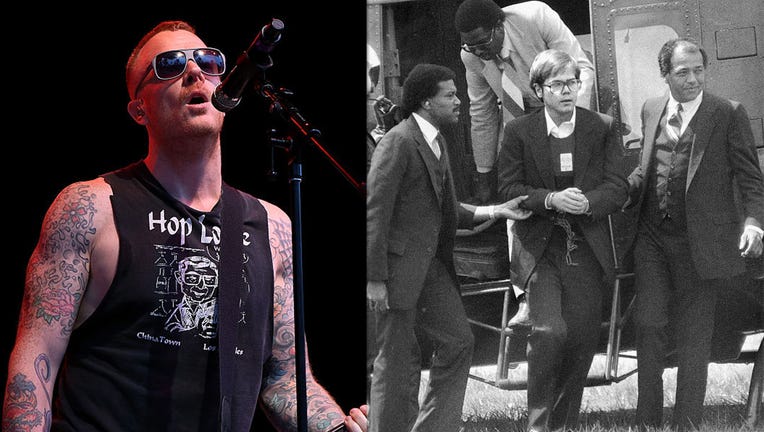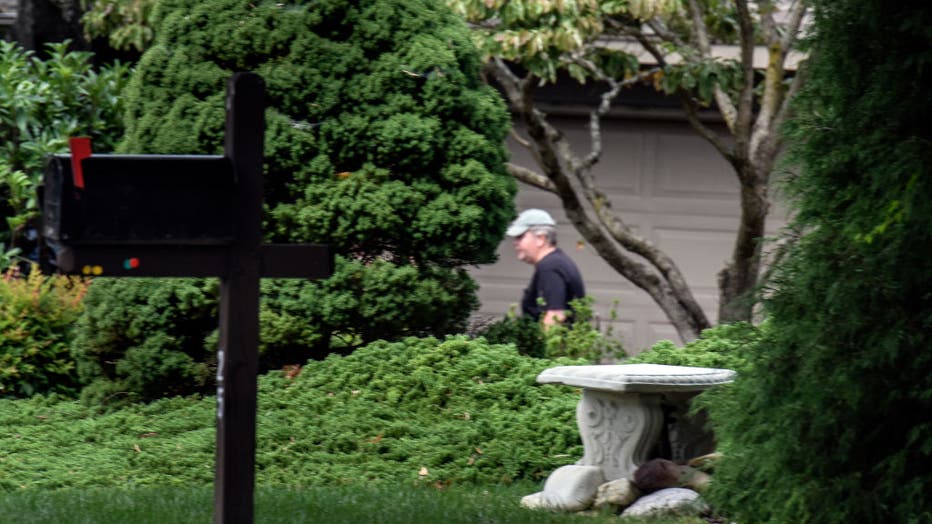John Hinkley Jr. talks to Eve 6 frontman about his music, redemption: 'I'm not that person anymore'

(L) Max Collins of Eve 6 performs at The Greek Theatre on July 19, 2015, in Los Angeles, California. (Photo by Jeff Golden/Getty Images) (R) John W. Hinckley Jr. arrives at the Marine Corps base at Quantico, Va., after completing extensive psychiatri
John Hinckley Jr., who shot and wounded President Ronald Reagan in 1981, is now completely free from court oversight and aims to redeem himself "through my music and art."
Hinckley, now 67, gave a recent interview to Input Mag and Eve 6 frontman Max Collins, discussing his hopes for a music career and the concept of redemption. In a 2021 tweet, Hinckley once listed Eve 6 — the band behind songs like "Inside Out" and "Here’s to the Night," as among the musical artists he was listening to at the time.
Upon seeing mention of his band, Collins tweeted a reply, "lets do a song together john" — which is something yet to happen.
In the recent interview, which was officially conducted by Input features editor Mark Yarm, Collins described Hinckley’s music as having "a through line of hope... which is difficult to do."
"But with John’s songs, there’s a sadness about them, too," Collins explained. "There’s a sadness and a kind of longing that amplifies and gives authenticity to the hopeful sentiment. I believe him when he’s singing about this stuff, and the positive stuff — the hope stuff — feels like it was hard-won for him."
Hinckley was found not guilty by reason of insanity in the March 30, 1981, shooting of Reagan in Washington, D.C. Reagan was seriously wounded in the assassination attempt, and his press secretary, James Brady, was left paralyzed.
Secret Service agent Timothy McCarthy and Washington Police Officer Thomas Delahanty were also wounded in the shooting, which was motivated by Hinckley's obsession with the actor Jodie Foster.
Hinckley spent decades in a psychiatric hospital before being released to live with his mother in 2016. He was freed from court oversight as of June 15, writing on Twitter, "After 41 years 2 months and 15 days, FREEDOM AT LAST!!!"
In recent years, Hinckley has released songs on Spotify and shared videos of himself singing and playing guitar on YouTube.
"I did the whole thing. I’m a one-man band," Hinckley said in the Input interview, published on Monday. "On all the songs on Spotify, there’s only two songs where another guy is helping me out, but all the rest of them I do all the instruments and vocals and everything."
Hinckley described himself as "a ‘60s guy," listening to that decade of rock ’n’ roll, including a lot of Beatles songs and Bob Dylan. He started writing songs as a teenager and after taking "about eight lessons," he taught himself how to play the guitar. He now plays on a Fender acoustic-electric.
"It’s not a great guitar, but I like the feel of it. It’s decent," Hinckley noted.
His older songs, Hinckley guessed, sound like he’s aspiring to be happy. But on his newer songs, "I’m already happy."
"But if you hear a tinge of sadness, it’s because I did 35 years in a mental hospital. And let me tell you, that’ll take a lot out of you to be an inpatient in a mental hospital for 35 years. It takes a lot out of you spiritually, physically, emotionally," Hinckley said.
Hinckley had planned public performances in Brooklyn, Chicago, and in Hamden, Connecticut, following his release from court supervision, but all were recently cancelled.
Last week, the Market Hotel in Brooklyn cited "very real and worsening threats and hate" in its announcement on social media that it was canceling the July 8 concert.
"There was a time when a place could host a thing like this, maybe a little offensive, and the reaction would be, ‘It’s just a guy playing a show, who does it hurt — it's a free country,'" the Market Hotel said on Instagram. "We aren't living in that kind of free country anymore, for better or for worse."
In the Input interview, Hinckley said he had pressed for heavy security at the shows and if they could have "come to an agreement that the venues were secure, I think the concerts should have gone on."
When asked about a general objection to supporting the person who once shot the U.S. president, Hinckley replied: "That’s on them to decide that. I can’t make them change their mind as to what they think about me. But I’m trying to establish myself as a singer-songwriter and also an artist."
Hinckley became a household name after shooting and wounding the 40th U.S. president and others. But today, historians say he is at best a question on a quiz show and someone who unintentionally helped build the Reagan legend and inspire a push for stricter gun control.
"For the president himself to have been so seriously wounded, and to come back from that — that actually made Ronald Reagan the legend that he became ... like the movie hero that he was," Barbara A. Perry, a professor and director of presidential studies at the University of Virginia’s Miller Center, told the Associated Press last week.
After being shot, Reagan told emergency room doctors that he hoped they were all Republicans. He later joked to his wife Nancy that he was sorry he "forgot to duck."
When the president first spoke to Congress after the shooting, he looked "just a little bit thinner, but he’s still the robust cowboy that is Ronald Reagan," Perry said.
In 1993, President Bill Clinton signed into law the Brady Bill, named after Regan’s press secretary who was left disabled. It required a five-day waiting period for handgun purchases and background checks of prospective buyers.
‘I’ve redeemed myself through my music and art’
Hinckley was 25 at the time of the shooting and suffering from acute psychosis. When jurors found him not guilty by reason of insanity, they said he needed treatment and not a lifetime in confinement. He was ordered to live at St. Elizabeths Hospital in Washington.
In the 2000s, Hinckley began making visits to his parents’ home in a gated Williamsburg community. A 2016 court order granted him permission to live with his mom full time, albeit under various restrictions after experts said his mental illness had been in remission for decades.
Hinckley’s mother died in July. He signed a lease on a one-bedroom apartment in the area last year and began living there with his cat, Theo, according to court filings.

John Hinckley, Jr., 61, arrives home in the gated Kingsmill community on Saturday, September 10, 2016, in Williamsburg, VA. (Photo by Jahi Chikwendiu/The Washington Post via Getty Images)
Over the years, the court restricted Hinckley from owning a gun or using drugs or alcohol. He also couldn’t contact Foster, the actor with whom he was obsessed at the time of the shooting, or any of his victims or their families.
U.S. District Court Judge Paul L. Friedman, the federal judge overseeing Hinckley's case, said on June 1 that Hinckley has shown no signs of active mental illness since the mid-1980s and has exhibited no violent behavior or interest in weapons.
"This is the time to let John Hinckley move on with his life, so we will," the judge said.
Now completely free and pouring himself into music, Hinckley named his tour "the Redemption Tour," and noted to Input Magazine how he’s trying to get away from his negative public image.
"I mean, to be redeemed is internal — it’s not what somebody down the street thinks," Hinckley said. "I’m not that person anymore. At all. And I’m trying to show them that I’ve redeemed myself through my music and art."
But when pressed about whether he feels he can be redeemed for shooting Regan and others over four decades ago, Hinckley said he didn’t want to dwell on the past.
"I’m not sure if ‘redeemed’ is the right word. But, you know, I want to kind of keep this to the music, if you don’t mind, and not go back to all that," Hinckley told the interviewers.
"You know, a lot of the interviewers, they do this. They say, ‘Oh, we’ll just talk about the music.’ And they veer off into things from the past, and I’m trying not to do that. I’m trying to not dwell on the past," Hinckley continued.
This story was reported from Cincinnati. The Associated Press contributed.

